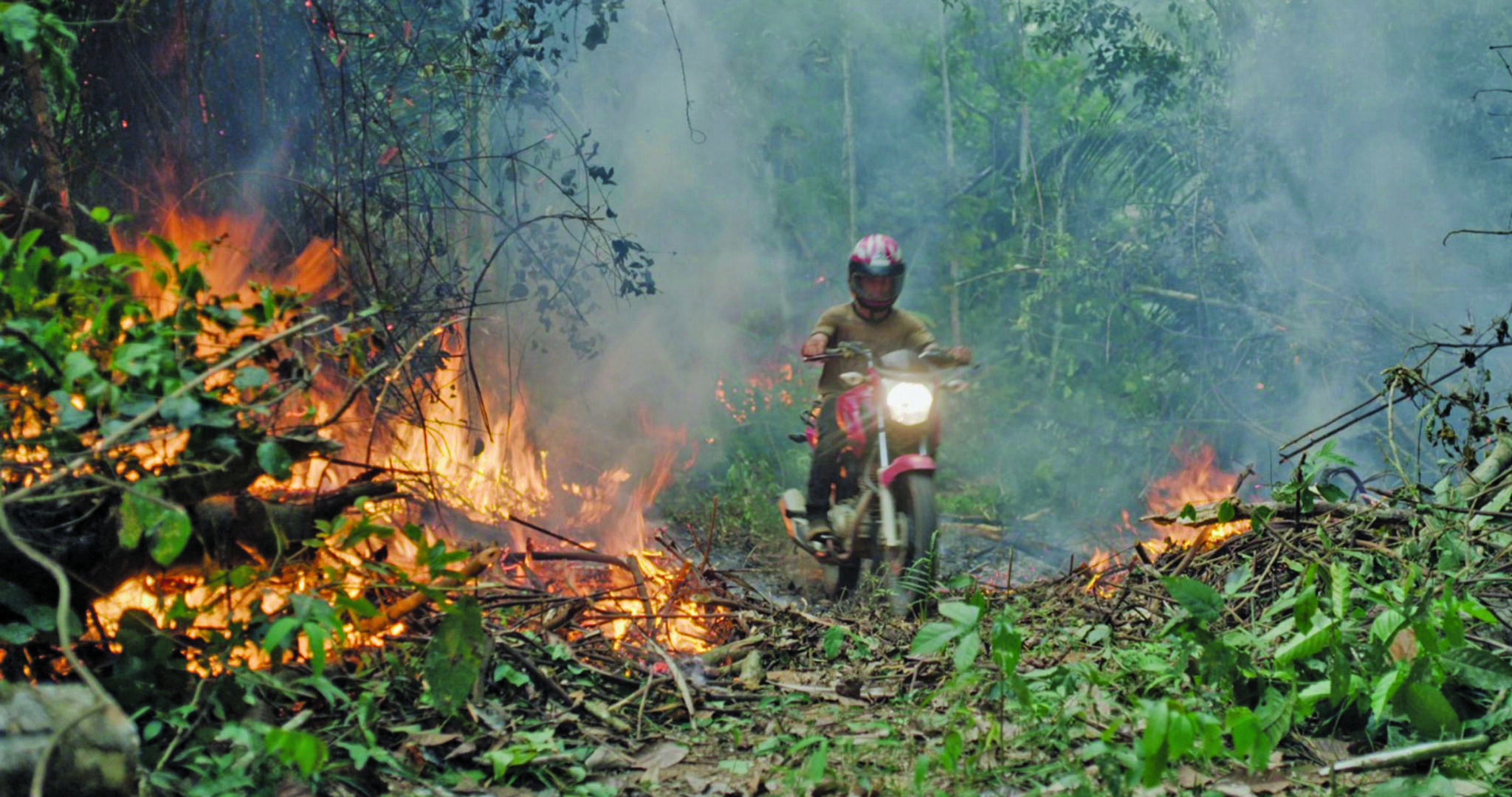A still from “The Territory,” by Alex Pritz, an official selection of the World Cinema: Documentary Competition at the 2022 Sundance Film Festival.
Courtesy of Sundance Institute
By Vanessa Zimmer
The landscapes we know and love, the furred and winged beasts we admire, the very air we breathe — and even our inner landscapes — are being threatened by global warming, pollution, and overall mismanagement and/or corruption.
The Sundance Institute treasures the importance of films that document harm to our environment and the hope that we can correct our global course. Indeed, for the last 20 years, it has had an entire team, the Documentary Feature Program, that channels financial support to such projects.
As the Institute celebrates Doctober, members of the DFP program have selected a list of Sundance-supported environmental documentaries with particular resonance from the past two decades.
So, let’s take an eco-tour of these nonfiction films.
These titles were supported by the Sundance Institute | Kendeda Fund, which aids artists telling stories of environmental sustainability amid varied social challenges. The Kendeda Fund is an Atlanta, Georgia–based organization dedicated to helping humans develop an equitable world, use resources wisely, and interact mindfully.
The Territory (2022) — The Indigenous Uru-eu-wau-wau fight the deforestation of their Brazilian home by logging and mining interests, farmers, and illegal settlers. They consider the Amazon rainforest not only the heart of Brazil, but also the heart of the world. Director Alex Pritz filmed the documentary, also incorporating footage provided by the Uru-eu-wau-wau. In addition to receiving Sundance Institute funding, the film played the 2022 Sundance Film Festival, winning the Grand Jury Prize and Audience Award in the world documentary category, as well as a Special Jury Award for Documentary Craft. Released in theaters in August, the film is expected to stream on Disney+, Hulu, and Star+ later this year.
Hollow Tree (2022) — This coming-of-age story, described as a parable for climate adaptation, follows three teenagers growing up in southeast Louisiana’s fragile delta. According to the film’s website: “Their different perspectives — as Indigenous, white, and Angolan young women — shape their story of the climate crisis.” The documentary received Sundance Institute support starting in 2018 and most recently in 2022. “We are so excited to see this film premiere next month at the New Orleans Film Festival,” says Dominic Davis, manager of the Documentary Film Fund. “From that screening, the film team will kick off their impact campaign… Director Kira Akerman collaborated with her protagonists, young people inheriting communities on the front lines of the climate crisis, to research how to survive a dramatically changing planet.”
Delikado (2022) — A network of environmental activists defends the island paradise of Palawan from those seeking to exploit its natural resources. Some are murdered. Delikado also exposes President Rodrigo Duterte’s “war on drugs” in the Philippines, which has resulted in thousands of deaths. The International Criminal Court of Justice has said the actions may constitute a crime against humanity. “Delikado offers a breathtaking insight into what it means to be an environmental activist in the Philippines today, by chronicling the fight of three incredibly courageous men who risk their lives to defend the Philippines’ ‘last ecological frontier’ from corrupted politics and corporate interest,” says Paola Mottura, director of the Documentary Film Fund. The film can be seen here.
Tigre Gente (2021) — The illegal jaguar trade is sweeping across South America, including Bolivia’s Madidi National Park. A Madidi park ranger and a Chinese journalist attempt to halt this threat to the species, which is being used as a substitute for tiger parts in traditional Chinese medicines. The film was directed by Elizabeth Unger.
Newtok (2021) — This documentary follows the plight of Newtok, Alaska, a village of 360 Yup’ik residents on a delta at the edge of the Bering Sea. The villagers are experiencing the effects of climate change. Their land is being lost — very quickly — due to the thawing permafrost and erosion. The plan is to rebuild the town on firm ground. But where will the money for the project come from? Will the federal government fund the relocation? Watch the film here.
Akicita: The Battle of Standing Rock (2018) — Native activist and filmmaker Cody Lucich directed this film about the 2016 standoff between the Native people and the oil industry over the Dakota Access Pipeline site — in what was described as the largest Native American occupation since Wounded Knee. Protesters gathered on the Standing Rock Reservation in North Dakota to oppose the construction of the pipeline, and militarized police were sent to the site.
Awavena (2018) — This immersive film installation appeared in the New Frontier section of the 2018 Sundance Film Festival, after receiving funds from the Sundance Institute between 2016 and 2019. “Hushuhu, the first woman shaman of the [Amazonian] Yawanawá, uses VR [virtual reality] as medicine to open a portal to another way of knowing. Awavena is a collaboration between a community and an artist, melding cutting-edge technology and transcendent experience so that a vision can be shared, and a story can be told of a people ascending from the edge of extinction,” programmer Shari Frilot wrote in the Film Festival Guide. The film was made, according to the Awavena website, “during a time of both peril and potential for their people, their forest, and the connected ecosystems that drive the planet.”
Silas (2017) — Activist Silas Siakor fights the environmental destruction brought by logging into his beloved Liberia. His charisma and leadership speaks to the wider community, teaching them to stand up to corruption and those who hold power, and unite in resistance. The film was directed by Anjali Nayar and Hawa Essuman.
These films received support from the Sundance Documentary Fund.
All That Breathes (2022) — Two Muslim brothers, and their cousin, have made it their life’s work to save the ill and injured black kites that fall from the gray, polluted skies above New Delhi. Winner of the top documentary award at both the Sundance and Cannes film festivals, this quiet and lyrical documentary examines the family’s admiration for and commitment to this intelligent medium-sized raptor. “We are so happy to have been amongst the first supporters of this mesmerizing film by the incredibly talented Shaunak Sen… The film offers a beautiful poetic meditation on all living and breathing creatures and the role of humans amongst them,” says Mottura. Released in New York City theaters on October 21, in Los Angeles theaters on October 28, and streaming sometime in 2023.
Geographies of Solitude (2022) — Scooping up awards at 2022 film festivals around the globe, Jacquelyn Mills’ documentary delves into the life of Zoe Lucas, an environmentalist and naturalist who has lived for 40 years on remote Sable Island, in the northwest Atlantic. The film is a “playful and reverent collaboration with the natural world,” according to its website: “Zoe leads us among wild horses, seals and bugs, through peaks, valleys, roots, sands, weathers, seasons and stars.” Footage follows Lucas as she collects, cleans, and documents litter that washes ashore. “Geographies of Solitude is a gorgeous and playful film that has forever changed how I look at the everyday (like balloons) through observing the process of one naturalist meticulously cataloging the human impact on Sable Island, a place across hundreds of miles of ocean from the next nearest person,” says Davis.
The Hottest August (2020) — Director Brett Story offers a portrait of New York City during the sweltering August of 2017. The film asks ordinary New York residents about climate change, divisive politics, and their hopes for the future. Available on Fandor.
The Landfall (2020) — Hurricane Maria devastated Puerto Rico and exposed the fragility of the United States’ relationship with its island territory. This documentary, directed by Cecilia Aldarondo, reports that more than 5,000 people died as a result of government inaction. For rent on Amazon Prime or through Vimeo.
The following film received support from the Sundance Institute | Sandbox Fund, which aids independent artists exploring the link between science and culture.
The Invisible Extinction (2022) — Scientists and partners Marty Blaser and Gloria Dominguez-Bello go on a mission to save the healthy bacteria in the human body that are being destroyed by the overuse of antibiotics, processed foods, and elective C-sections. The disappearance of the microbes, the two say, is happening faster than climate change. Still on the film festival circuit.




